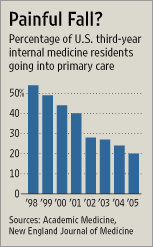LEMON LAWSUITS
John Lemon reacted to my post on Kinsley’s piece on tort reform last night. For the most part, he’s simply addressing a different aspect of the issue, personal responsibility, with which we are in essential agreement.
I differ with John on some minor points, though:
First, I rarely, if ever, hear somebody calling a medical malpractice suit a “frivolous lawsuit.” That is usually reserved for the drunk guy’s family who sues SeaWorld after said drunk guy decides to go swimming with Willy late one night.
Frivilous is of course a subjective term. But I’d classify suits against doctors who were sober and competent but whose patient had unfortunate outcomes as “frivilous.” The problem with such suits is that the process becomes the punishment. The time and money spent defending–and insuring–against these suits is a huge resource drain. And, occasionally at least, plaintiffs hit the jackpot with these cases.
Second, both Kinsley and James miss a more important and philisophic point that is at the heart of tort reform: our society is increasingly disassociating risk from responsibility, which in turn is creating perverse incentives for productive behavior in many parts of our economy. Let me explain.
After which comes several paragraphs saying, essentially, that tort suits are all unjustified because they should be dealt with by private insurance or criminal law. Of course, then we’d wind up suing insurance companies who don’t want to pay instead of doctors who don’t want to pay. And, from a pure practical politics standpoint, if we’re having a rough time getting caps put on damages, there’s no way we’re going to simply eliminate an entire class of lawsuits.






Actually, when you sue a doctor, it is the insurance company that pays. That’s the point of malpractice insurance. The only way the doctor would pay is if he did not have malpractice insurance, which is a highly risky strategy for a doctor, and is illegal in most states if I am correct. Thus, “we’d wind up suing insurance companies…” is incorrect; we already are suing them albeit through the doctor.
Also, your statement that “we’d wind up suing insurance companies…” doesn’t address the issue of disassociating risk and responsibility that I made in my post. This is a cultural (values- and norms-based) problem that will not be solved by capping settlements (see the Barrel for more). To an increasing degree, I sense that in our society that if a mistake is made — even an honest one that may be associated with routine risk-taking — the person who falls “victim” to the mistake demands compensation and/or “retribution” (cf. the Gibb family following the death of Maurice).
Whatever happened to those bumper stickers that said “shit happens”? That is actually a pretty good slogan for the champions of tort reform.
I am also disheartened to see the word “we’d” in the aforementioned sentence. Hopefully you’re not including yourself in the class of “frivolous lawsuers…” (although you could get me on a technicality here given that I claimed to never have heard “frivolous” used to describe a specific malpractice case).
And in terms of “frivolous” malpractice cases, I could envision there being some SPECIFIC cases so labelled, most likely to be found in the field of cosmetic surgery (“the surgeon didn’t make me look pretty enough”). I would like an example of a SPECIFIC malpractice case (outside of plastic surgery) that has widely been considered “frivolous.” (Like I had said, I think Kinsley tries to tie malpractice cases with the most idiotic lawsuits to spin his argument to cover all tort reform.)
—